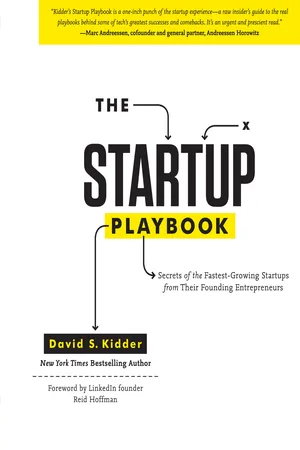![]()
JIM MCCANN
FOUNDER:
1-800-FLOWERS.COM
INTRODUCING JIM MCCANN
Unlike many of the entrepreneurs in this book, retail florists seldom face “all-or-nothing” outcomes. The probability of bankruptcy is extremely low; the probability of a comfortable, middle-class life, quite high. By the early 1980s, Jim McCann had achieved exactly that. With fourteen Flora Plenty stores throughout New York City, he was face-to-face with ambition’s greatest enemy: comfort.
Thirty years earlier, Jim was the oldest child in a struggling Queens family. As he put it in his perfectly titled memoir, Stop and Sell the Roses, “I saw myself going down the same road my father traveled: hand-to-mouth, chasing down customers, dealing with checks that bounced as high as a four-story walk-up.” Because he had known its opposite, Jim understood the value of comfort. He had a clear, visceral awareness of how much he had to lose. Nevertheless, he bet it all.
In 1986, Jim purchased a failing Texas company called 800FLOWERS. He was confident that the 800-number was the disruptive technology of its time, and that making the brand identical with the number was brilliant marketing. To prove his thesis, he took a $17 million bet, risking everything he had built at Flora Plenty, and renamed his company 1-800-FLOWERS. The bet paid off. In 1993, the company had more than $100 million in sales.
By the time Jim brought 1-800-FLOWERS public in 1999, after a decade devoted to building the company, he might have gotten comfortable and stagnated. He didn’t. That same year, he changed his company’s name again to announce a new disruptive technology he had embraced. From now on, it would be 1-800-FLOWERS.COM.
In a radically fragmented marketplace that values lifestyle businesses, Jim wanted a category winner and he got it. There are more than 15,000 florists in the United States, and Jim is in the top position. More important, he has maintained that position for over twenty years. This is not luck. This is a brilliant businessman at work—one, moreover, who will never settle for comfort.
JIM’S STORY*
Jim began his career as a social worker in his hometown of Queens, New York. He was the manager of a church-run home for “wayward” boys in Rockaway, making a good salary for the time. It wasn’t enough.
Jim McCann: I wanted more out of life. I wanted to make more. I wanted more stimulation than I was getting on the old nine-to-five. I wanted to work for myself. This made me a budding entrepreneur, but at that point I didn’t have any comprehension of what an entrepreneur was.
Jim’s first step toward entrepreneurship was to buy an existing business.
A retail store sounded like a good way to enter the business world. I had worked in retail stores in my neighborhood and noticed that the owners seemed to live well. One day, while satisfying my genetic requirement as a young Irish boy in Queens—working as a bartender in the first Friday’s located on 1st Avenue in New York—I heard one of my customers mentioned possibly selling his flower shop located just across the street.
I liked the idea of flowers as a business. People are always getting married, having birthdays, graduating from high school, retiring, apologizing to girlfriends. Flowers and the customers for them are endlessly renewable resources.
Here was a retail business already up and running that I could buy. So I maxed my credit cards, borrowed from my family, and raised $10,000, which bought me Vic’s shop at 1st Avenue and 62nd Street, an old but rapidly disappearing Irish-Italian neighborhood, where the likes of Jimmy Cagney and Whitey Ford had played stickball as kids.
I was an entrepreneur—and a successful one—but it took a long time before I believed my success was going to last. I was like some of the bankers and stockbrokers I know who never give up their taxi licenses—just in case.
Jim’s instincts were correct. Over the next several years he used all his profits from the first store to open one new store per year, naming his new chain Flora Plenty.
Eventually, Jim reached the point where most entrepreneurial careers end: comfort.
THE 1-800-FLOWERS.COM STORY
Technically, Jim is not the original founder of 1-800-FLOWERS. He first got involved with the company that owned the phone number by fulfilling orders through his chain of Flora Plenty flower shops in New York. When their orders began dropping off, Jim did some research and sensed a key opportunity. He was right: Dallas-based 800FLOWERS was failing. Jim bought the company in 1986 and renamed it 1-800-FLOWERS. As he explains in Stop and Sell the Roses, “We inherited forty boxes of useless records and a phone number.” He also inherited $7 million in outstanding debts.
Despite these early challenges, 1-800-FLOWERS became an incredible success. The company went public in 1999. Today, 1-800-FLOWERS has more than $700 million in annual revenues.
Between the morning I plunked down $10,000 for my first store and the afternoon when I paid millions for 1-800-FLOWERS, the story is one of ten years of growth from a small small business to a big small business. If it had ended there, you wouldn’t be reading this. Financially, I would have been very comfortable. By 1983, the year my brother Chris joined us full-time, we had grown to fourteen shops in the New York area and were, as far as I am aware, the only twenty-four-hour, full-service florist chain in the nation.
Comfort did not end Jim’s career. Soon after his brother joined the business, Jim was going to risk it all on a much bigger bet.
I remember exactly where I was the first time I heard about 800FLOWERS. It was 7:14 on the morning of November 16, 1984. I had just showered and was shaving. I was at that critical part when you purse your lips and squinch them to one side as you try to bloodlessly trim your upper lip. I had the radio on and some fast-talking announcer was extolling the virtues of a nationwide florist service called 800FLOWERS.
I was stunned. A company whose name was the same as its phone number. What a concept! I got the hugest tingle I have ever felt in the presence of a brilliant business concept. I have a clear, physical memory of continuing to shave with my face all contorted while my image in the mirror did a double take and turned to the real me and said—“McCann, that is the greatest idea you have ever heard. Do something about it!”
I had to get in touch with 800FLOWERS. I wanted to be part of them.
Flora Plenty became a fulfilling florist for 800FLOWERS, but it didn’t take Jim long to see that there were problems. “The ads disappeared. And then the orders started to decline.” The original investors wanted new management and approached Jim. He was excited for the opportunity, but after two years of negotiations he was almost ready to move on. It was at that moment that an original investor in 1-800-FLOWERS suggested something much more ambitious than a change in management. If Jim wanted to buy the company, he would back him. In 1986, Jim became the new owner of 800FLOWERS.
I had buried myself in debt and I was going to have to climb out of it or sink. So within a week of becoming the proprietor of the far-flung, thoroughly debt-ridden, renamed 1-800-FLOWERS “empire,” there I was on the phone at a makeshift desk of planks and packing crates, working the hold buttons. “Thank you for calling 1-800-FLOWERS; this is Jim speaking. How can we help you today?”
Within five years, Jim had paid the company’s debts and assured its continued growth. “As silly as it might sound today,” he told me, “an 800-number was the disruptive new technology of its time.” Jim was also an early adopter of the next great disruptive technology: the Internet. Back when he wrote Stop and Sell the Roses in 1998, he still needed convincing about its potential. He wrote then:
An alarming thing happened on January 1, 1996. 1-800-FLOWERS was named the single most successful business application on the World Wide Web. I say “alarming” because after all the hype about the way the Internet is transforming our lives, to have our little company come in ahead of Microsoft and IBM tells you about how far the Web has to go before it begins remotely to fulfill the predictions we see in the television commercials.
The Web would fulfill the predictions, and Jim would respond by changing the company’s name from 1-800-FLOWERS to 1-800-FLOWERS.com. He brought the company public in 1999.
THE JIM MCCANN PLAYBOOK
Focus on What’s Important
We all work hard. We’re all as busy as can be. When it doesn’t seem like we could possibly get any busier, we do. But if you’re not focused on the right things, you’ll be the busiest guy on the way to the poor house. You have to focus on the right things in the right order, and you have to tolerate a lack of perfection. There will always be more tasks than time and more decisions than data. Your task is to determine what’s really important: what do you have to do and do well? The challenge is the same whether you’re running a startup or a multi-billion dollar company that’s been around for thirty-five years.
Being Poor Is Exhausting
The biggest mistake I made at the beginning was bootstrapping. Managing an underfunded startup is terribly exhausting. It zaps all of your energy. All of your focus is devoted to keeping the expenses under control, managing your payroll, or getting the next dollar. You’re forced to spend a completely disproportionate amount of energy keeping the ship afloat rather than rowing it in the right direction. You have no other choice. My lack of knowledge and sophistication in the beginning caused me to waste a lot of time, energy, and resources on being poor. To avoid that route, get the funding you need.
Curate Your Superego
I’m a mimic. I mimic good ideas, and I mimic people who have characteristics that I like. I’m a mimic when it comes to attitude, so I try to surround myself with people who I can catch attitude from. It’s similar to Freud’s idea about the id, the ego, and the superego. The superego is your conscience, the voices in your head telling you what to do. Those voices come from the books you read or the people you encounter, personally and professionally. There are a dozen people in my life whose voices I want in my head, especially when I’m in the depths of a problem. They can help you step back, simplify things, and see the forest for the trees.
JIM’S BEST ADVICE
BUSINESS OPERATIONS
Privilege Internal Advisers over Consultants
We modified our compensation structure a few years ago, and we were about to hire a firm to help us do it. I mentioned this to one of our board members while we were having a glass of wine. He said, “I don’t have anything against consulting firms, but I know your firm as well as anybody. Let me save you some time and money here.” Then he pulled a pad out of his briefcase and redesigned our compensation structure in about twenty minutes. It was spot-on. We were about to spend $280,000 on a consulting engagement. Instead, he said, “You pick up the $28 check for the wine and we’re done.”
CULTURE
Cultivate Alumni
When we were a young company, I used to become upset wheneve...

